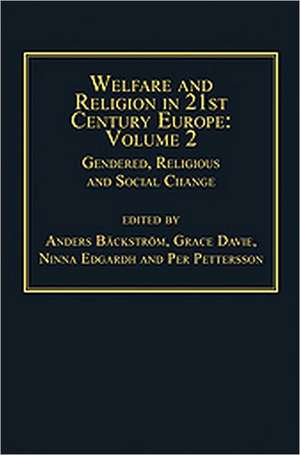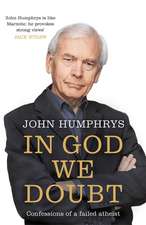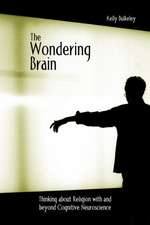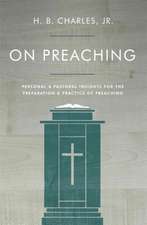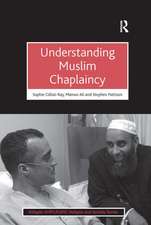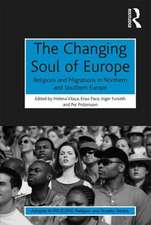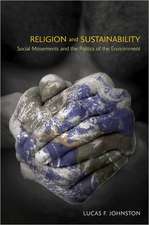Welfare and Religion in 21st Century Europe: Volume 2: Gendered, Religious and Social Change
Editat de Anders Bäckström, Grace Davie, Ninna Edgardh, Per Petterssonen Limba Engleză Hardback – 11 mai 2011
| Toate formatele și edițiile | Preț | Express |
|---|---|---|
| Paperback (2) | 414.32 lei 6-8 săpt. | |
| Taylor & Francis – 11 mai 2011 | 414.32 lei 6-8 săpt. | |
| Taylor & Francis – 21 ian 2010 | 416.22 lei 6-8 săpt. | |
| Hardback (2) | 1057.09 lei 6-8 săpt. | |
| Taylor & Francis – 11 mai 2011 | 1057.09 lei 6-8 săpt. | |
| Taylor & Francis – 21 ian 2010 | 1113.91 lei 6-8 săpt. |
Preț: 1057.09 lei
Preț vechi: 1289.13 lei
-18% Nou
Puncte Express: 1586
Preț estimativ în valută:
202.34€ • 219.86$ • 170.07£
202.34€ • 219.86$ • 170.07£
Carte tipărită la comandă
Livrare economică 21 aprilie-05 mai
Preluare comenzi: 021 569.72.76
Specificații
ISBN-13: 9780754661078
ISBN-10: 0754661075
Pagini: 212
Dimensiuni: 156 x 234 x 13 mm
Greutate: 0.52 kg
Ediția:1
Editura: Taylor & Francis
Colecția Routledge
Locul publicării:Oxford, United Kingdom
ISBN-10: 0754661075
Pagini: 212
Dimensiuni: 156 x 234 x 13 mm
Greutate: 0.52 kg
Ediția:1
Editura: Taylor & Francis
Colecția Routledge
Locul publicării:Oxford, United Kingdom
Cuprins
Contents: Preface; The WREP project: genesis, structure and scope, Anders Bäckström and Grace Davie; Welfare in Western Europe: existing regimes and patterns of change, Eva Jeppsson Grassman; The Church of Sweden: a church for all, especially the most vulnerable, Ninna Edgardh and Per Pettersson; Sacred welfare agents in secular welfare space: the Church of Norway in Drammen, Olav Helge Angell; The church as a place of encounter: communality and the good life in Finland, Anne Birgitta Pessi; The German dilemma: Protestant agents of welfare in Reutlingen, Annette Leis-Peters; The 'in-between' church: church and welfare in Darlington, Martha Middlemiss Lé Mon; Church-state relations in France in the field of welfare: a hidden complementarity, Corinne Valasik; What kind of church? What kind of welfare? Conflicting views in the Italian case, Annalisa Frisina; The disgraceful and the divine in Greek welfare: the cases of Thiva and Livadeia, Effie Fokas and Lina Molokotos-Liederman; A preliminary conclusion: gathering the threads and moving on, Anders Bäckström and Grace Davie; Appendices; Bibliography; Index
Notă biografică
Anders Bäckström is Professor of the Sociology of Religion, Uppsala University, Sweden; Grace Davie is Professor Emerita of Sociology, University of Exeter, UK; Ninna Edgardh is Associate Professor of Ecclesiology, Uppsala University, Sweden; Per Pettersson is Associate Professor of the Sociology of Religion, Uppsala and Karlstad Universities, Sweden. All four authors have worked together on a number of projects. These include: From State Church to Free Folk Church (a study of the constitutional changes in the Church of Sweden), Welfare and Religion in a European Perspective (the basis of this book) and Welfare and Values in Europe (an EU funded project). They are currently engaged in a new Linneaus Research Programme, entitled The Impact of Religion: Challenges for Society, Law and Democracy. This is based at Uppsala University and is funded by the Swedish Research Council.
Descriere
Historically, European churches have played a large part in the provision of welfare. Responsibility, however, has gradually shifted to the state - a shift that forms an integral part of the process of secularization and one that has been readily accepted by European populations. But what happens when the state itself begins to recede - a process t
Recenzii
’... the contributors ably show how questions of religious identity and belonging are central in understanding the welfare-religion relationship. ... The researchers forecast a greater role for religious groups in welfare provision, not only because of financial strains in most systems and aging populations, but also because of the more personal approach and cultivation of 'local knowledge' that characterize these groups. Yet, at the same time, the secularization well advanced in most of these countries means that churches are struggling to sustain their core functions, and that welfare recipients may not be very receptive to a faith-based approach.’ Religion Watch 'In a carefully designed collaborative volume, the editors and contributors uncover a relationship between religion and welfare in Europe that is diverse, complex, and pervasively relevant.' Journal of Contemporary Religion '... a particularly valuable contribution...' Journal of Social Policy ’This well-organized project is both informative and challenging and shows that the churches still have the potential to enhance rather than diminish the lives of Europeans, even though there may well be, as there always has been, a tension between the pastoral and the prophetic.’ Theology
